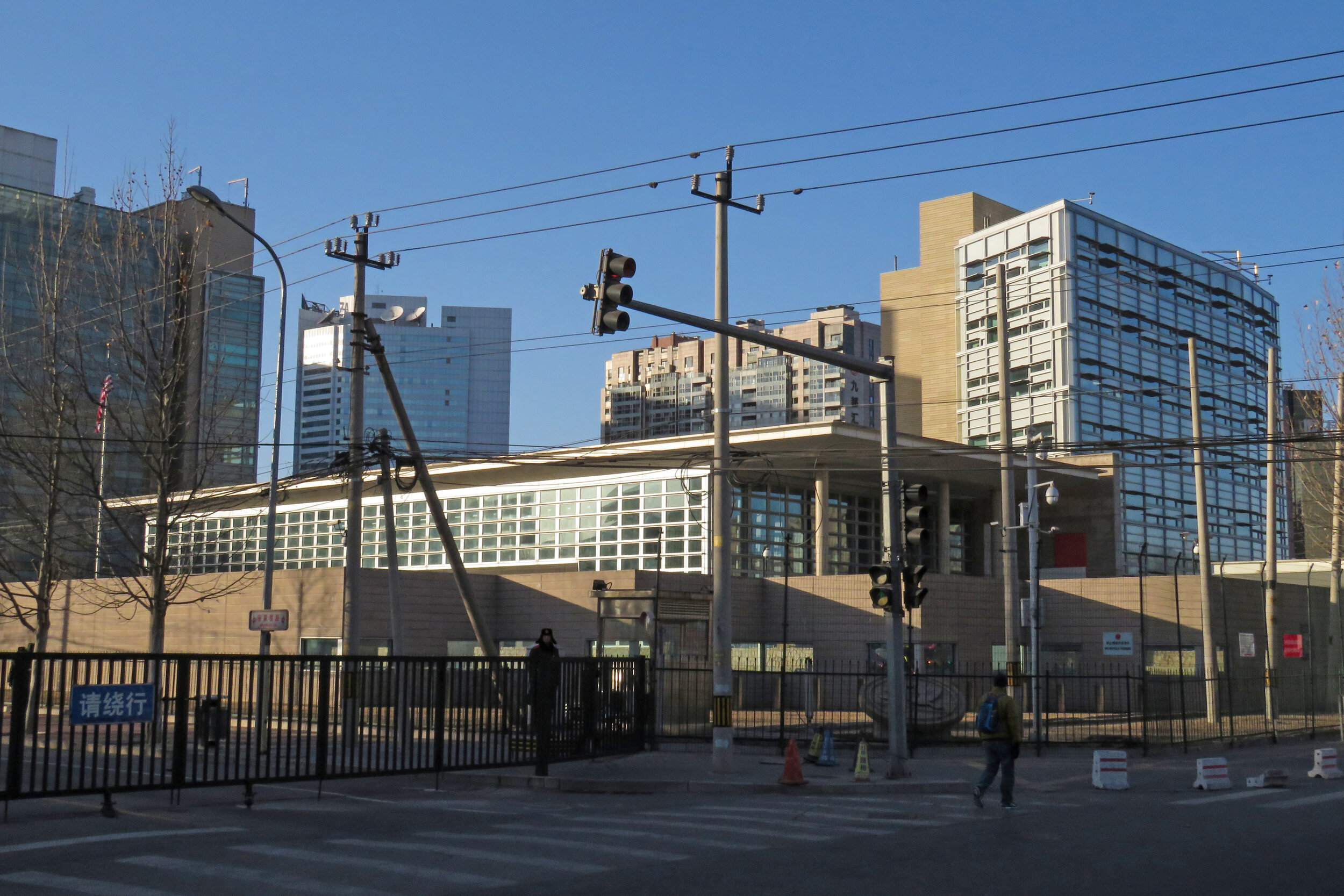Chinese international students face visa difficulties due to closure of U.S. embassy, consulates
The U.S. embassy in Beijing. The U.S. embassy and consulates in mainland China suspended routine visa services in February, and Chinese students at Boston University have faced many hurdles before they could return to campus. COURTESY OF N509FZ VIA WIKIMEDIA COMMONS / CC BY-SA (https://creativecommons.org/licenses/by-sa/4.0)
By Serena Zhang
Most of Tong Wu’s friends were getting ready for school when the Chinese graduate student at Boston University stepped onto a flight from Beijing to Phnom Penh, Cambodia, filled with nerves. He booked the trip for one purpose: to obtain a U.S. visa.
The United States suspended regular visa services in mainland China in February due to COVID-19 resulting in limited staffing at the U.S. embassy in Beijing and consulates in the country.
The Department of State announced on July 14 that they would begin to resume visa services at their embassies and consulates on a post-by-post basis, depending on conditions on the ground. The department does not provide specific dates for when the embassies and consulates will resume specific visa and routine services.
The sudden closure affected many incoming Chinese international students, forcing them to make a choice between studying remotely in China and traveling to other countries with U.S. embassies that are processing visa applications.
Wu said he thinks that the tension between China and the United States right now may be a reason for the delayed opening.
In July, the U.S. abruptly gave China a 72-hour window to close its consulate in Houston, Texas, citing the reason as protecting Americans’ intellectual property and private information, according to a CNN article.
In response, China ordered the U.S. to close its consulate in Chengdu, with the same three-day time frame, claiming it was involved in a U.S.-wide Chinese espionage effort.
“It’s definitely frustrating to see how much people’s lives, including me, are affected by the pandemic and the political situation right now,” Wu said. “This year is especially hard for people like us who are in between two countries.”
Right now, the round-trip flight ticket price from Phnom Penh to Beijing has almost tripled to $3,600, and his hotel is full of Chinese people trying to obtain visas.
According to Wu, who is studying music performance, because his degree requires high-resolution video and high-quality sound transmission, taking classes via Zoom would seriously affect teaching and learning experiences.
“Even though traveling is costly and unsafe considering the pandemic, I had no choice but to take the risk,” Wu said.
Traveling is not the only challenge Wu faces. He mentioned that obtaining a visa is not easy, and a certain portion of students cannot pass the U.S. visa interview. If he is lucky and succeeds, he will book a flight directly to Boston, he said. Otherwise he has to stay in Phnom Penh for at least another month until he passes the interview.
Lynn Lin, an incoming graduate student studying journalism in BU’s College of Communication, said she wants to study in-person because interpersonal interaction is an essential part of studying that remote learning lacks.
“Siting in front of a laptop and watching recordings every day is so boring and stupid,” Lin said. “I wanted to go to Boston because I will regret it if my first semester at BU is like this.”
According to their website, the BU International Students and Scholars Office recognizes that most U.S. consular posts have suspended visa processing. The ISSO website states that it will continue to issue and send I-20s, a document required for visa applications, to incoming international students.
However, the website did not provide a clear solution to the challenges Chinese students are facing.
“While ISSO staff will be happy to advise you on the US immigration documentation required for travel, unfortunately, we cannot offer any assurances if you choose to travel,” the website stated.
After reaching out for an interview, BU ISSO said they were unable to comment on the university’s position on the restrictions due to “lack of bandwidth at ISSO during these turbulent times.”
Sally Song, an incoming graduate student studying media science in COM, said the travel and visa difficulties may force her to take another path.
She said that if the COVID-19 pandemic and the political issues between China and the United States continue, she will attend another university in the United Kingdom instead of BU.
“I get the feeling that international students, especially Chinese students, are not welcomed or valued, ” Song said. “This kind of fear and uncertainty will certainly push more and more international students away.”

